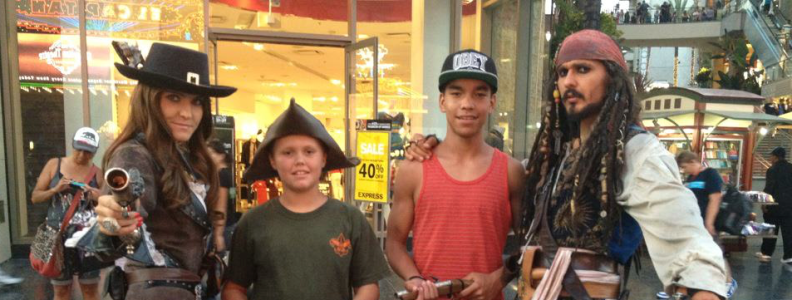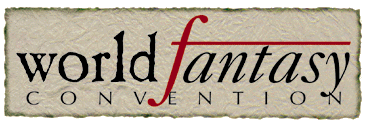For fans, conventions are all about having fun, meeting people who share your interests, and having a weekend of unbridled and unapologetic geekiness. We gather at convention halls to meet our favorite authors or film stars, to attend panels, and to shop for art, books, collectables, costumes, and gadgets. Conventions are inherently a celebration of all that is nerdy, and so it only makes sense that they be as varied as the fans who attend them.
However, as authors, conventions are also a business trip. At a convention, we can sell our books – both to industry professionals and directly to fans. By observing what is popular, we can keep our fingers on the pulse of fandom and learn the tastes of our target audiences. The convention hotel bar is a great place to meet people, network, and make friends who understand the struggles of being an aspiring author.
Even though conventions are an invaluable experience, I know of very few people who have an unlimited budget and the freedom to travel as they please. The rest of us need to choose carefully how best to use our vacation time and financial resources. Even if you don’t consider all of the seminars and workshops offered, there are hundreds, if not thousands, of conventions worldwide. The task of narrowing down your choices may seem overwhelming, but if you approach selecting conventions with your goals in mind, you can make the process much more manageable.
Though all conventions are unique experiences, I’ve noticed that most seem to fall somewhere along a series of five continuums. By properly placing the perspective convention, I have found it easy to evaluate the convention’s personality and utility to an aspiring professional.
CONTINUUM 1: Big Cons vs Small Cons
Much of a convention’s personality is a function of its size. Cons with larger numbers of attendees have more leverage with local hotels, businesses, and governments as they represent a massive and predictable influx of tourism. As such, they will be able to secure special rates with the nearby businesses, and convince local municipalities to shut down roads and parks. They will attract the attention of higher profile guests and be able to pay for their appearance fees, travel, and lodging.
No matter how much good the influx of a hundred thousand people does for the local economy, there is a draw back. Larger cons are inherently more chaotic, have longer lines for events, and tend to react more slowly to change. They can easily become overwhelming for someone who is unused to or uncomfortable in those sorts of crowds. It’s also very hard to get noticed in such a large group. If you are looking to shop a book, for example, I’d recommend somewhere a bit more intimate, where you can take the time to get to know agents and editors rather than have 2.5 seconds of their attention as you pass in the mass of humanity.
CONTINUUM 2: Party Cons vs Business Cons
Some conventions, like World Con or World Fantasy, are largely focused on getting business done. Sure, there’s still partying, but most of that is geared towards networking. Editors and agents go to these sorts of conventions to acquire new talent and catch up with old friends in the industry.
On the other hand, conventions like Dragon*Con or Salt Lake City Comic Con lean more heavily towards celebration than business. Though it’s possible to seal a deal at these sort of conventions, the odds of getting the attention of an industry professional are not in your favor. They are, however, a fantastic place to meet and interact with fans, as well as sell lots of books in the dealer’s room.
CONTINUUM 3: Narrowly Focused Cons vs Multi-Track Cons
When you are in charge of organizing a con’s content, how do you choose? Some cons focus on a single vein, such as steam punk, horror, anime, or even the works of a particular author. For example, JordanCon is a convention held each spring in Atlanta. Its founders chose to focus on the works of Robert Jordan and all things tied to the Wheel of Time. On the other end of the spectrum, Dragon*Con, also in Atlanta, is a sprawling agglomeration of every possible fan interest. You get a lot more depth at a convention like JordanCon and a greater variety at a gathering like Dragon*Con. Both approaches have their advantages.
CONTINUUM 4: Content Cons vs Dealer’s Cons
Though every convention is going to have some sort of dealer’s room, some conventions, such as World Fantasy, focus mostly on the panels, parties, and other social interactions between fans and guests. On the other hand, conventions like San Diego Comic Con have massive dealer’s rooms and much of their attendees’ focus is on acquiring merchandise and collectibles. If you are looking to learn something, go to a content con. If you are looking to buy from vendors or sell to consumers, go to a dealer’s con.
CONTINUUM 5: Static Cons vs Traveling Cons
Some conventions, like Bubonicon or Space City Comic Con, are held in the same city, even some times on the same weekend, year after year. They are inherently easier to plan for, and tend to have better relationships with local business and governments. Additionally, local celebrities and authors tend to adopt a “home convention” that they attend year after year.
Other conventions, such as any con with the word “World” in the title, travel to new destinations each year. What they lack in stability, they gain in variety of experience and often leverage with the locals. After all, Spokane, Washington likely bent over backwards to win their 2015 bid for World Con. Albuquerque, New Mexico on the other hand probably won’t go to the same extreme for Bubonicon, which is held there year after year.
Want to see the world? Follow a traveling convention, but you’re travel costs will likely be proportionally more expensive. It’s often best to catch such events as they cycle through a city near you.
So, how do you know what sort of convention you’re in for? It’s simply a matter of research. Your social network will go a long ways to help you with this. Find friends who have been to the convention in question and ask them their opinions and experiences. Another good option is to peruse the convention website. What sort of guests are they expecting? Cons with guest lists heavy in celebrities and authors often are content cons while those who have tons of artists lean more towards the dealer’s floor. Additionally, you can search through public media, blogs, and social media sources for coverage of the previous year’s event. Those sorts of articles will often report attendance numbers and focus on the perceived high points of the convention’s programming.
Ultimately, only you can know what sort of convention will best fit your needs and interests. Are you actively trying to sell a book to traditional publishers? You might focus on finding a small, business focused con. Or, are you trying to meet your favorite author or celebrity? In which case, you should look for a large, narrowly focused, static con. Do you want to be entertained at a party, content focused convention, or are you trying to find a rare printing of a comic book at a dealer’s convention? There’s a buffet of experiences ready for you to sample. All you have to do is pick up a plate and make a decision as to where to start.
 I live in Arizona with my family, wife and five kids and a little dog. I write fiction, thrillers and soft sci-fi with a little short horror on the side. I’ve got an MBA and work in finance for a biotechnology firm.
I live in Arizona with my family, wife and five kids and a little dog. I write fiction, thrillers and soft sci-fi with a little short horror on the side. I’ve got an MBA and work in finance for a biotechnology firm.


 Evan Braun is an author and editor who has been writing books for more than ten years. He is the author of The Watchers Chronicle, whose third volume, The Law of Radiance, was released earlier this year. In addition to specializing in both hard and soft science fiction, he is the managing editor of The Niverville Citizen. He lives in Niverville, Manitoba.
Evan Braun is an author and editor who has been writing books for more than ten years. He is the author of The Watchers Chronicle, whose third volume, The Law of Radiance, was released earlier this year. In addition to specializing in both hard and soft science fiction, he is the managing editor of The Niverville Citizen. He lives in Niverville, Manitoba.